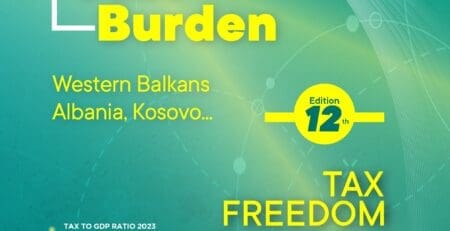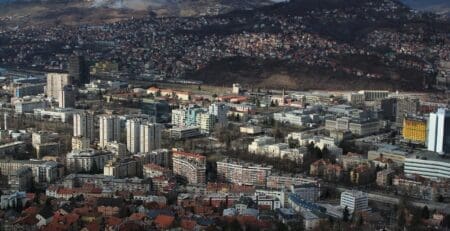Headline inflation and energy – fuel inflation in the OECD and the Balkans, August – October 2023
Headline inflation (year-on-year) in the OECD, as measured by the Consumer Price Index (CPI), eased to 6.2% in September 2023 from 6.4% in August, following increases in July and August.
Inflation fell between August and September in 27 OECD countries. In contrast, it rose in 8 OECD countries, with increases of around or more than one percentage point (p.p.) in Spain, Costa Rica (the only OECD country where headline inflation was negative), Slovenia and Turkey.
Energy inflation rose between August and September in 22 OECD countries but remained negative in the OECD. Energy inflation turned positive for the first time since February 2023, softening the ongoing slowdown in food and core inflation.
Germany recorded a sharp decline in headline inflation from 6.1% in August to 4.5% in September, driven by a sharp decline in energy inflation. In France, energy inflation on a year-over-year basis rose to 11.7% in September after 7.0% in August, partly reflecting gradual pricing outside the basket.
A more difficult inflationary situation is seen in the countries of the Western Balkans. Likewise, the prices of energy and energy materials have also increased.
Serbia‘s annual average inflation eased to 10.2% in September from 11.5% in the previous month. While the inflation of energy and energy materials increased between August and September 2023 by 0.4%. Energy and fuel inflation in October 2023 compared to a year ago increased by 9.42%
Inflation (measured by the consumer price index – CPI) increased by 10.1% in the first eight months of 2023 in Montenegro compared to the same period a year ago. The inflation rate was more influenced by the increase in the prices of food and non-alcoholic beverages, which in the observed period increased by 14.4%.
A high price increase has been noted for housing, water, electricity, gas, and fuels, which are higher by 11.8% in the period January – August 2023 compared to the same period of 2022. Energy inflation and fuels in September was 7.4%.
The annual rate of inflation in Bosnia and Herzegovina slowed to 4.1% in September 2023 from 4.7% in August. Prices rose at a lower rate for restaurants and hotels (6.9% vs. 7.3%), food and non-alcoholic beverages (6.3% vs. 8%), recreation and culture (6.2% vs. 7.0%), and housing and utilities (5.1 % versus 7.3%). They also continued to fall for clothing and footwear (-7.2% vs. -5.8%) and transportation (-4.2% vs. -6.4%). On a monthly basis, consumer prices rose 0.6%, slowing from a 1% advance in the previous period.
Meanwhile, the price for energy and fuels in September 2023 was 4.73%
Consumer prices in Kosovo rose by 3.3 percent (year-on-year) in October 2023, slowing from a 4.2 percent increase in September, as the cost rose at a softer pace for food and non-alcoholic beverages (3.9 percent vs. 5.5 percent), transportation (0.6 percent versus 2 percent), housing and utilities (2.6 percent versus 3.9 percent), alcoholic beverages and tobacco (5.6 percent versus 6.6 percent percent), furniture, household appliances and maintenance (5.1 percent versus 5.5 percent).
On the other hand, inflation accelerated for miscellaneous goods and services (3.2 percent vs. 2.7 percent), clothing and footwear (3.5 percent vs. 3.4 percent), entertainment and culture (5, 3 percent versus 3.5 percent) and health (3.8 percent versus 3.6 percent).
Meanwhile, the price for energy and fuels in September 2023 was 4.1%.
North Macedonia‘s average consumer prices rose by 6.6% (year-on-year) in September, following an 8.3% annual increase in August. On a monthly basis, consumer prices in North Macedonia decreased by 0.1% in September, after increasing by 1.2% in August.
Meanwhile, the price for energy and fuels in September 2023 (year-on-year) increased by 6.1% and only 0.1% compared to the month of August.
Albania’s annual inflation rate slowed to 3.8% in October 2023, from 4.1% in September, marking the lowest rate since January 2022, as prices slowed for food and non-alcoholic beverages (7.4% vs. 7.9%), furniture, maintenance (5.2% vs. 5.4%) and housing services (1.6% vs. 2.1%). Also, transport costs fell at a faster rate (-8.3% versus -7.2%). Conversely, inflation accelerated for recreation and culture (7.6% vs. 4.9%), hotels, cafes, and restaurants (4.8% vs. 4.7%), and alcoholic beverages and tobacco (3.6% vs. 3.0%). On a monthly basis, consumer prices rose 0.1% in October, softening from a 0.7% increase in the previous period.
Meanwhile, the price for energy and fuels in September 2023 (year-on-year) increased by 23.2% and only 7.44% compared to the month of August.




Leave a Reply
You must be logged in to post a comment.